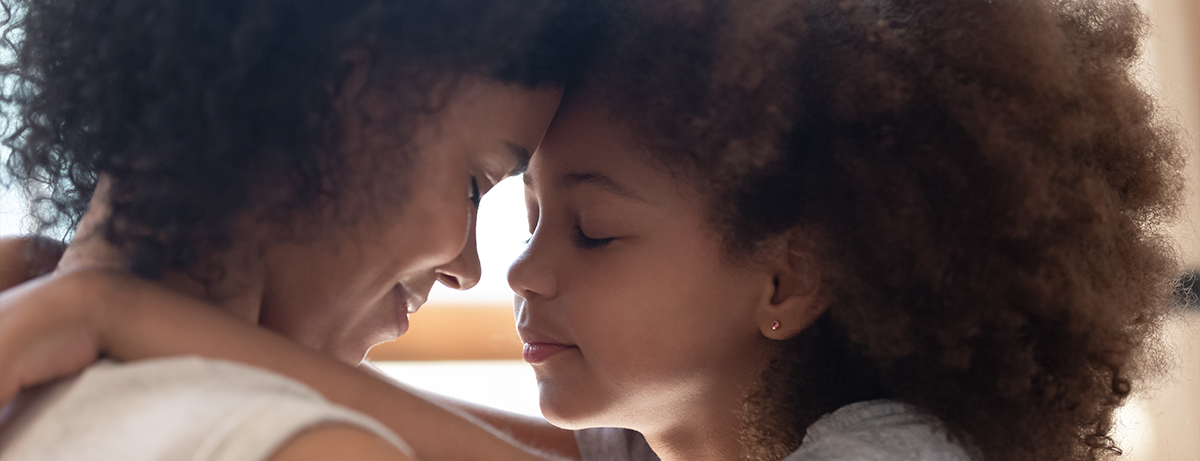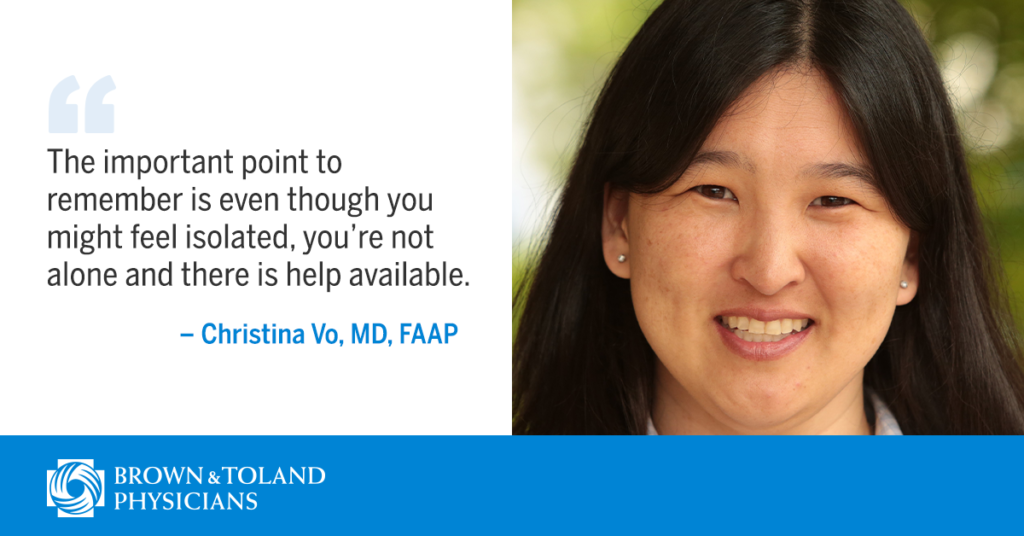Dr. Christina Vo: Navigating Your Child’s Physical and Mental Health Needs During the COVID-19 Pandemic

Brown & Toland pediatrician Christina Vo, MD, FAAP, first came to her current practice, East Bay Pediatrics, as a parent. On each visit with her baby, she asked if there was an opening for another pediatrician because she could tell that the practice had everything she wanted: great physicians, skilled staff and stability. “I love being able to see children grow and develop while helping parents go through both the trials and tribulations of parenthood,” said Dr. Vo. “I want to see my patients grow up and have children of their own.”
Dr. Vo grew up in Menlo Park and majored in East Asian Studies as an undergraduate at Princeton University. After completing medical school at the University of California, San Diego, she returned to the Bay Area to complete her pediatric residency training at Children’s Hospital and Research Center Oakland, now UCSF Benioff Children’s Hospital Oakland. Now the managing partner at East Bay Pediatrics, Dr. Vo adds: “I know that I have been at the practice for 16 years because my daughter is now learning to drive!”

Should I bring my child to the pediatrician for their scheduled well child visit, do a telehealth visit or wait until after the pandemic?
Everyone has been afraid to go to the doctor, even for serious conditions. We’ve seen patients with lacerations who wouldn’t go to the ER, people with asthma attacks or UTIs who wouldn’t seek treatment, so there are many medical issues that are being neglected out of fear or exposure to COVID-19.
For babies and infants, well visits are important for many reasons – there is just so much going on developmentally that babies need to be seen every two to three months. Growth needs to be monitored at this early stage in life. Most of these visits involve vaccinations and stopping vaccine-preventable diseases is so important.
For older kids, it’s a bit different but the need for routine well visits is just as important. Patients of all ages should be seen every 1-2 years for routine well visits. At the start of the pandemic, we were deferring some well visits since we were expecting only a few months delay; now we are scheduling in-person well visits as usual. Though some practices are offering these appointments virtually, we’ve decided to do only in-person well child visits since vital signs and a full physical exam are not possible via telemedicine.
This is because monitoring growth and development — physically, mentally and emotionally — are so important. Many children are preparing to enter kindergarten, some are starting puberty, others are preparing for college. We do not want to miss issues that have a critical window for intervention such as scoliosis, vision problems, eating disorders, depression or anxiety. Patients on chronic medications also need to have routine monitoring.
Why is vaccinating children, particularly during the pandemic, so important?
Think about this: though we’ve had a few cases of measles in the Bay Area over the last few years, the disease has been nearly eradicated in the U.S. thanks to vaccines. If kids stop getting vaccinated, measles – a condition with high death rates and one that disproportionately affects children – can return. Both measles and chickenpox are more easily transmitted by air than COVID. The vaccine to prevent meningitis is also very important for the same reasons.
What about the flu vaccine?
The flu vaccine is more important than ever this year, for adults and children. First, there’s the risk of being co-infected with both the flu and the coronavirus and the affect that could have on overloading the health care system. Second, kids can spread the flu to adults more easily than they can spread COVID-19, including family members who may be immunocompromised. Third, the illnesses may appear very similar, increasing the stress level on patients and their families if someone does get sick. Also, the chances that a COVID-19 vaccine will be available to children within the next several months is low.
How are you and other pediatric practices ensuring your offices are safe from COVID-19 and other illnesses?
Our practice is fortunate because we have two locations. Our Orinda office is for well-visits only, while pediatricians at our Berkeley location schedule well visits in the morning and see sick patients only after 1 p.m. Appointment times are also carefully staggered to limit the number of people in the offices at one time, and families with children older than three months are asked to have only one caregiver or parent accompany the patient. These changes are in addition to thorough exam room and equipment cleanings after each visit, screening everyone who enters the practices and offering virtual visits whenever appropriate. (Note: For more about the changes East Bay Pediatrics has made to enhance families’ safety, visit their website.)
What should parents do if their child is having a hard time emotionally?
There is certainly a high level of anxiety out there right now, and it’s even more difficult for those with underlying mental health issues, including children. The fact that kids are not in school where teachers and others can look out for signs of depression or anxiety can make the problem worse. I advise parents that if they’re worried about their child’s emotional health, talk to your pediatrician about options. Is your child suddenly having tantrums? Has your autistic child become more difficult to handle? Is your teenager showing signs of an eating disorder? Your pediatrician will help you determine the root causes and recommend next steps. The important point to remember is even though you might feel isolated, you’re not alone and there is help available.
Any advice for children missing out on social interactions while being isolated at home right now?
Determining what kinds of social interaction is appropriate – for kids and adults — can be complicated and there is no single solution that will fit every situation. The answer will depend on several factors including how many high-risk people are in a household. If a family can assess their risk level, they can determine whether they are able to interact with another family or two who are following the same criteria. Very young kids transmit virus much less, so sending your younger kids to preschool is relatively safe, but the risk level increases as the child gets older. During the current shelter in place order, it is so important to follow the updated public health recommendations.
What advice would you give families who are unsure what to do? What precautions are you taking in your own family?
Again, it’s so Important for families to utilize information coming from public health officials and follow the guidelines being issued as closely as possible. Bay Area public health has been great — very timely and very clear. The Alameda County Public Health Department, for example, recently posted a PDF on guidelines for gathering and travelling during the holidays.
I have two teens at home (13 and 16 years old) who have been distance learning and have been exemplary with wearing masks and taking all of the necessary precautions. It makes me feel better about them going out and having a social life, though one that’s more limited than it used to be. Forming a pod with my sister’s family, coupled with all of the safety protocols in place at my practice, makes me feel that I can visit my immuno-compromised mother without putting her, my family or my sister’s family at risk. During the newest shelter in place order, my family and I are following public health guidelines to keep interactions within our immediate family.
